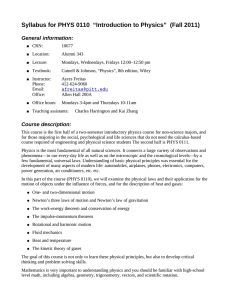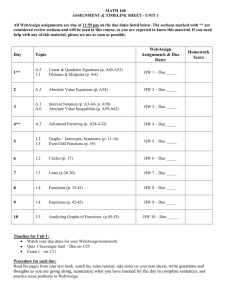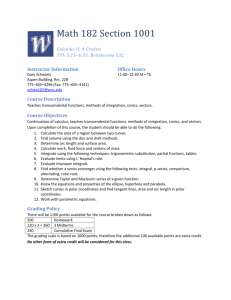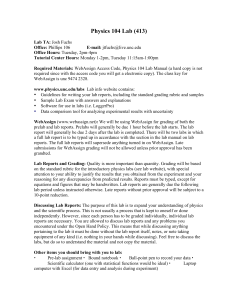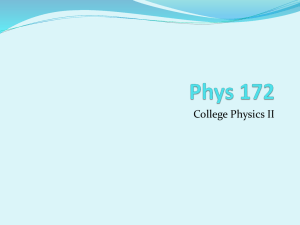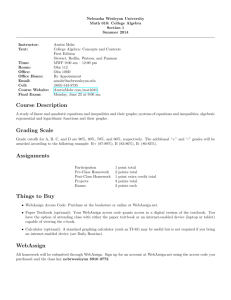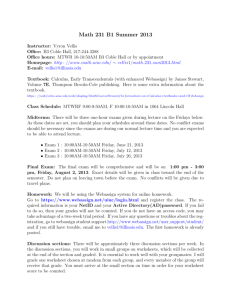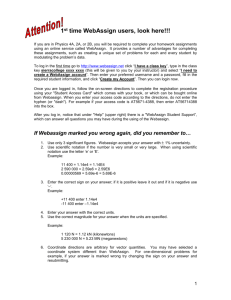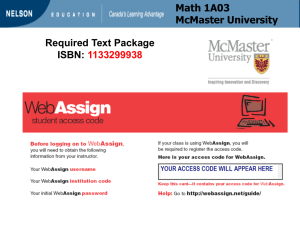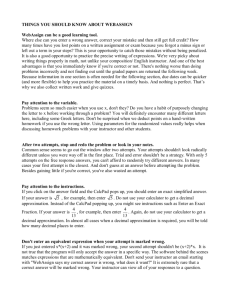Syllabus for PHYS 0110 “Introduction to Physics” (Fall 2012)
advertisement
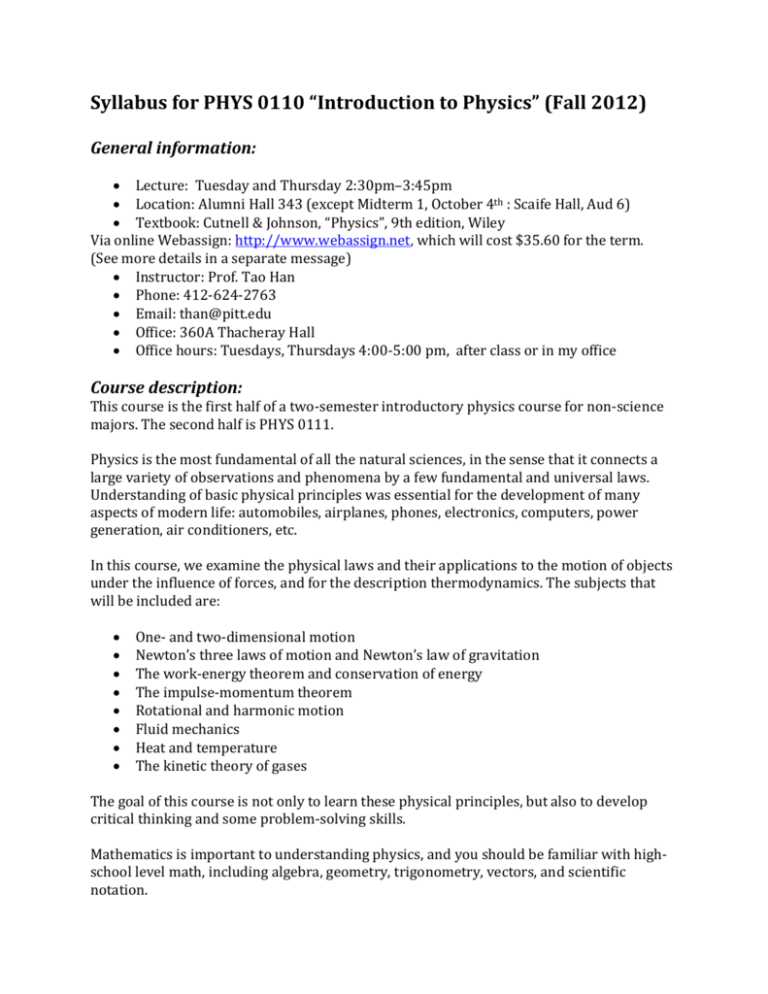
Syllabus for PHYS 0110 “Introduction to Physics” (Fall 2012) General information: Lecture: Tuesday and Thursday 2:30pm–3:45pm Location: Alumni Hall 343 (except Midterm 1, October 4th : Scaife Hall, Aud 6) Textbook: Cutnell & Johnson, “Physics”, 9th edition, Wiley Via online Webassign: http://www.webassign.net, which will cost $35.60 for the term. (See more details in a separate message) Instructor: Prof. Tao Han Phone: 412-624-2763 Email: than@pitt.edu Office: 360A Thacheray Hall Office hours: Tuesdays, Thursdays 4:00-5:00 pm, after class or in my office Course description: This course is the first half of a two-semester introductory physics course for non-science majors. The second half is PHYS 0111. Physics is the most fundamental of all the natural sciences, in the sense that it connects a large variety of observations and phenomena by a few fundamental and universal laws. Understanding of basic physical principles was essential for the development of many aspects of modern life: automobiles, airplanes, phones, electronics, computers, power generation, air conditioners, etc. In this course, we examine the physical laws and their applications to the motion of objects under the influence of forces, and for the description thermodynamics. The subjects that will be included are: One- and two-dimensional motion Newton’s three laws of motion and Newton’s law of gravitation The work-energy theorem and conservation of energy The impulse-momentum theorem Rotational and harmonic motion Fluid mechanics Heat and temperature The kinetic theory of gases The goal of this course is not only to learn these physical principles, but also to develop critical thinking and some problem-solving skills. Mathematics is important to understanding physics, and you should be familiar with highschool level math, including algebra, geometry, trigonometry, vectors, and scientific notation. Recitations: In addition to the lecture, you must attend one of the weekly one-hour recitation sessions associated with the class. The recitation is led by a teaching assistant (TA) who will take a short in-class quiz and discuss the current and/or next homework assignments (and your questions about them). Homework: The Homework for this course will be run online using the WebAssign system, which can be accessed at http://www.webassign.net . This website will gives you multiple opportunities to find the correct answer to a given problem, giving you instant feedback on whether your answers are correct, and opportunities to learn as you complete your homework. You will need to set up a user account on WebAssign. (See the details in another message) Please also ensure that you enter your name and student ID as they are found on your ID card when you sign up for your WebAssign account. You will need to become familiar with the Webassign system soon, because the first homework assignment is due on Wednesday in the second week (September 5). If you have any problems please see your TA or me in the beginning of the term. Discussing methods to solve the homework problems with other students, and forming study groups is strongly encouraged. However, you must always solve the problems on WebAssign yourself. This is necessary both because if you just copy someone else’s work you will not learn very much, and will do poorly on the exams, and because the numbers in most homework problems will be different from student to student. Lecture questions: Alumni Hall 343 is equipped with a Student Response System (SRS). The system consists of hand-held transmitters, called pads, which you will use to answer simple multiple-choice questions, which I will ask once of twice during each lecture session. You will be given one or two minutes to think about each question and discuss it with your neighbor. During this time the SRS receiver will pick up all the answers. At the end of the time the answers from each student will be recorded and a summary of the results displayed. At the beginning of the semester you will be assigned a number that corresponds to a particular pad. Make sure to memorize your pad number! The pads are stored in bins on a cart at the front of the lecture room. When you enter the room, pick up the pad with your number on it, and then place it back into the proper bin at the end of the lecture. Do not take your pad out of the classroom because someone else will be using the same pad! Answering to the lecture questions will count as extra credit towards the final grade. You will receive 100% for each correct answer and 80% for each question you answer incorrectly. Not answering a question at all results in no credit (0%); so it pays to always try. Courseweb and other resources: The class has a CourseWeb site where you can find useful materials, such as course materials, links, and grades (http://courseweb.pitt.edu). You are strongly encouraged to take advantage of the Physics Exploration Center (PEC), which is located at Thaw Hall 312. This room is generally open and staffed by a TA from 9am to 4pm Monday through Friday. The PEC is a learning center where selected demonstration experiments have been set up for you to explore on your own. One per week will be available. Concrete experimental experience can help you to improve your conceptual understanding of physics. PEC experiments are not required, but you can earn extra credit by finishing a high-quality report and handing it in to the TA. Within the PEC is the Physics Help Room staffed with TAs who can answer questions and help you with the lecture material, math and problem solving strategies. Grading scheme: The class will have two midterm exams and one comprehensive final exam. You may bring a calculator and one handwritten letter-size sheet with any notes you fit on it to each midterm exam, and four sheets to the final exam. No books, laptop computers, smart phones, or any other print or electronic media are allowed. Makeup exams will not be given without a valid excuse. The final grade is determined as follows: Quizzes 10%, Homework 20%, midterm 20% for each, and final exam 30%. Extra credit: You can earn up to a total of 3% extra credit by answering the lecture questions. You can collect additional points by doing the weekly lab activity at the PEC and handing in the reports (see above). Each complete and correct report is worth 0.3% extra credit. Important dates: Monday, August 27: First day of class (This class starts on August 28) Monday, September 3: Labor Day (University closed) Thursday, October 4: Mid-term Exam 1 Tuesday, October 9: No class, rescheduled for Monday 8th – i.e., regular Monday classes. Thursday, November 8, Mid-term Exam 2 November 21-25: Thanksgiving Recess December 10-15: Final Exam (to be scheduled) Academic integrity: Students in this course are expected to comply with University of Pittsburgh Policy on Academic Integrity. Disciplinary action may be taken for bringing unauthorized materials to an exam, obtaining exam materials before the beginning of the exam, cheating during an exam, posting homework solutions on the web or any discussion board, and other violations described in the policy. Disability resources and Services: If you have a disability for which you are or may be requesting an accommodation, you are encouraged to contact both your instructor and Disability Resources and Services, 216 William Pitt Union, (412) 648-7890 / (412) 383-7355 (TTY) as early as possible in the term. DRS will verify your disability and determine reasonable accommodations for this course.
